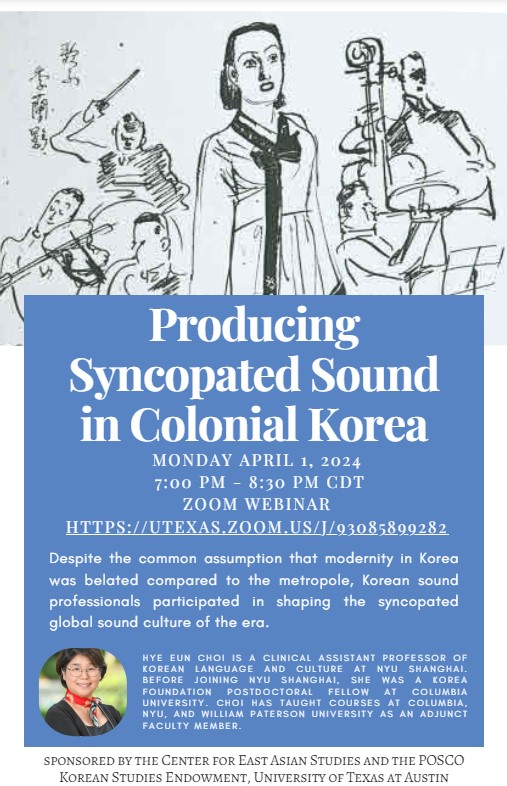time zone will be applied.
Report this post?

Please see details below for an upcoming Zoom Webinar that the Center for East Asian Studies, University of Texas at Austin is hosting with Professor Hye Eun Choi. For more information, please see the attached flyer or website post here.
Event Description:
We know that jazz provided entertainment for soldiers and the public under both the Nazis and Joseph Stalin, despite the official vilification it received from their regimes. E. Taylor Atkins adds that jazz did not vanish from Japan’s wartime soundscape either, as Japanese musicians could continue to perform it “for the country’s sake.” Was this phenomenon also present in Japan’s colonial periphery, notably Korea? In this talk, I demonstrate that Korean sound professionals were active in producing numerous songs incorporating jazz and other popular Western music genres, under the catch-all moniker of chaejŭ-song (lit. jazz songs), in the second half of the 1930s. Simultaneously, using a strategy I call “creative self-censorship,” they wrote songs with the qualities of chaejŭ-song but promoted them under other genre categories. That is, to meet their audience’s demands, they made much more syncopated music than it seemed at the time. As in Japan, the production of jazzy instrumental records categorized as the neutral-sounding kyŏng’ŭmak (“light music”) also increased in Korea during this time. Even after Japan entered total war in 1941, Korean sound professionals responded to the state’s restrictions on record production and its prohibition of jazz and Hollywood films by focusing on producing stage-based revue shows and musical dramas. They toured various parts of Korea as well as overseas, including frontline battlefields, and their cooperation with Japanese musicians became more frequent. Through these efforts, they could continue to experiment with contemporary musical trends and satisfy their audiences’ desire for new music as they navigated the colonial government’s censorship and war policies. Despite the common assumption that modernity in Korea was belated compared to the metropole, Korean sound professionals participated in shaping the syncopated global sound culture of the era.
About the Speaker:
Hye Eun Choi is a Clinical Assistant Professor of Korean Language and Culture at NYU Shanghai. Before joining NYU Shanghai, she was a Korea Foundation Postdoctoral Fellow at Columbia University. Choi has taught courses at Columbia, NYU, and William Paterson University as an adjunct faculty member. Her book project, tentatively titled “Inventing Modern Sound Culture in Colonial Korea (1910-1945),” is a multilayered history that traces the birth of the recording industry in colonial Korea, revealing how a new sound culture was formed not only under Japanese cultural hegemony but also in and through the currents of global modernity.
Sponsored by:
The Center for East Asian Studies (CEAS) and the POSCO Korean Studies Endowment, University of Texas at Austin
Organized by:
Rob Oppenheim, Professor, Department of Asian Studies, UT Austin.